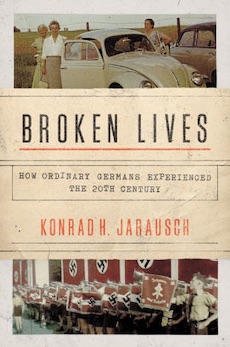By Benjamin Franklin Martin
Konrad Jarausch summarizes the multiple autobiographies that make up his assessment of Germany’s tumultuous twentieth century by declaring that they describe “how much ordinary Germans not only suffered from, but also contributed to their own catastrophes.” He has amassed reminiscences, notes, narratives, and memoirs from 82 men and women born between 1918 and 1933, the “Weimar Generation,” roughly twice as many males as females, more Protestants than Catholics, a smaller number of Jews, one-half from the upper middle class, one-third from the petite bourgeoisie, one-tenth from the working class. He relies heavily on a core of 17, somewhat less so on another 21, and occasionally on the remaining 44. Although they are by no means a representative sample, these autobiographies do, Jarausch insists, reveal “patterns of shared experiences, while the manner in which they are told shows retrospective tropes of memory.” If so, their portrayal of twentieth-century Germany is far from attractive.
Overwhelmingly, these Germans considered the Treaty of Versailles grievously unjust, with Jarausch himself referring to its “draconian conditions,” when in fact, the Treaty of Frankfurt, imposed by the new German Empire on France in 1871, was harsher in its requirements for territorial cession and reparations. Most agreed that the demise of the Weimar Republic and Hitler’s rise to power helped “Germany regain the greatness it deserves.” Over and over, they recalled membership in the Hitler Youth as exhilarating. Jarausch comments that they “were to suffer dearly for the blindness with which they followed the Führer into a war of annihilation.”
And regarding this war, the testimony of men provides damning evidence both of widespread atrocities by military units and of broad knowledge about the death camps. Women wrote that they did not object to the Nazi eugenic program unless it affected families close to them, and they supported the war until the bombing raids on German cities and the horror of mass rape by Soviet troops. Defeat meant utter devastation, great suffering and privation, and for a substantial number, expulsion from the eastern territories. Even then, and despite the evidence of photographs and newsreels, some refused to accept the evidence of genocide. Because so many men were dead or in prisoner of war camps, women had to lead the recovery from the rubble.
The victorious United States, Great Britain, and France quickly combined their zones of occupation to create West Germany, ensuring a parliamentary form of government, financial recovery through the Marshall Plan, and membership in NATO as a bulwark in the Cold War. Jarausch’s Germans called their new politics “donated democracy,” preferred to believe that they alone had accomplished the “Economic Miracle,” and truly embraced the regime only after experiencing the prosperity it generated. The Soviet Union’s zone became East Germany, with its socialist democracy under communist dogmatism enforced by the Stasi (Ministry of State Security). The many failures of the East German regime culminated in its collapse and the reunification of Germany in 1990.
Jarausch concludes that the lives of this Weimar Generation were disrupted by “historic forces outside of their control.” Certainly so, but integrity and decency are not always abandoned because circumstances make upholding them difficult. Reading their retrospective accounts suggests that these Germans failed to acquit themselves with much honor before the bar of history.
Benjamin Franklin Martin (ΦΒΚ, Davidson College) is Price Professor of History Emeritus at Louisiana State University. His most recent book is Roger Martin du Gard and Maumort: The Nobel Laureate and His Unfinished Creation (2017).




